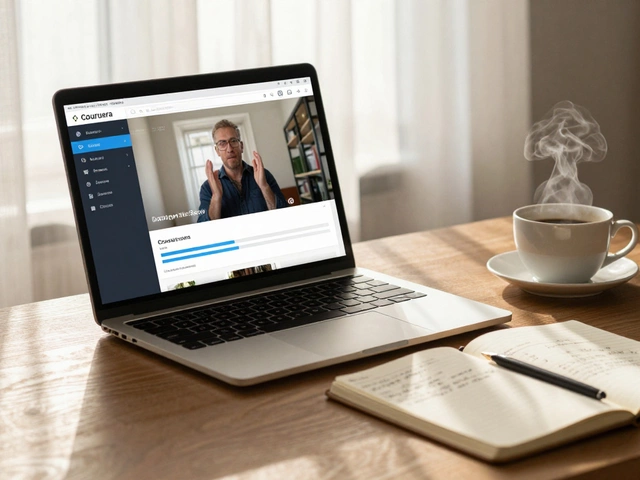Most people think you need a paid course to improve your English speaking, but there's a gold mine of free stuff online that works just as well—if not better. All you need is some curiosity and your phone or laptop. The secret? Knowing where to look, knowing how to practice, and not being afraid to make a few mistakes along the way.
Big sites like BBC Learning English, Duolingo, and Voice of America offer quality lessons and real-world conversations, all for free. You get video clips, short quizzes, and tons of everyday dialogues. These aren't just boring grammar drills—they let you hear how people actually talk, which is way more important if you want to sound natural.
If you want to take it up a notch, try language exchange apps like Tandem or HelloTalk. You match up with native speakers who want to learn your language, and you help each other out. It's like having a pen pal, but you actually talk, sometimes even on video or voice calls. The best part? You don't have to wait for a class or fit someone else's schedule. You practice when it works for you.
- Best Free Online Resources
- How Language Exchange Apps Boost Your Speaking
- Using Social Media and Forums for Practice
- Pro Tips for Getting Better, Faster
Best Free Online Resources
If you’re hunting for free English speaking practice, your best bet is to start with proven websites that millions use every day. A few big names have totally changed the game for learning English without paying a cent.
- BBC Learning English: This site’s full of short videos, interactive quizzes, audio series, and even a pronunciation section. Topics range from everyday conversations to work English, with new lessons added all the time. The 'English at Work' series is a hit if you care about conversations on the job.
- Voice of America (VOA) Learning English: Here, you get slow-spoken news, mini-dialogues, and real stories. Their 'Everyday Grammar' and 'Let's Learn English' videos are great for beginners and up. Plus, you’re listening to actual newsreaders, not robots.
- Duolingo: Their app is super popular for a reason. It’s fast, free, and gamified, keeping you hooked. While Duolingo covers reading, listening, and writing, it sneaks in speaking practice with quick tasks. Some learners get hooked and use it for years.
- YouTube Channels: Don’t overlook YouTube. Channels like "EnglishAddict with Mr. Duncan," "Rachel’s English," and "English with Lucy" pump out super practical speaking lessons and tips for sounding more natural. All free, and you can comment to ask questions.
Want a stat to back this up? In 2023, Duolingo reported over 500 million registered users worldwide, and the majority use it to learn English speaking skills. Free doesn’t mean second-rate.
| Resource | Focus Area | Best For |
|---|---|---|
| BBC Learning English | Video, audio, pronunciation | Everyday and workplace English |
| VOA Learning English | Slow news, grammar, real stories | Listening and vocabulary |
| Duolingo | Gamified lessons, quick practice | Daily bite-sized practice |
| YouTube | Speaking tutorials, accent help | Visual learners, casual practice |
Try mixing a couple of these resources daily. Watch a news story over breakfast, do a quick lesson on the bus, and follow a YouTube tutorial at night. You really don’t need to stick to one platform—jump between them to keep things fresh and build your real-life speaking practice.
How Language Exchange Apps Boost Your Speaking
Think about it: talking with a real person beats just repeating phrases to yourself or a screen. That’s where language exchange apps come in—they give you the chance to practice free English speaking with native speakers in real-time. The best-known apps for this are Tandem, HelloTalk, and Speaky. They’re pretty easy to set up. You pick your languages, fill out a quick profile, and the app matches you with folks wanting to learn your native language. It’s a swap—you help them, they help you, and both of you get to practice without spending money.
Here’s what makes these apps actually boost your English speaking skills:
- Real conversations: Forget textbook English. You learn phrases and slang that people actually use every day.
- Instant feedback: Your partner can point out mistakes and suggest better ways to say things, right on the spot. Most times, you’ll learn things you never get in a classroom.
- Voice, text, and video options: Not ready to speak out loud? Start with texting. When you’re more confident, you can switch to voice or video chats. No pressure.
- Fits your schedule: You choose when to chat. Ten minutes during your lunch break or a full hour at night—the schedule is yours.
As of early 2025, HelloTalk reported over 40 million users worldwide, with English being the most popular language for practice. That’s a massive pool of conversation partners. You’re not just limited to one person—you can join group chats or jump into public discussions on anything from travel to sports.
Try these tips for getting the most out of these online language courses in app form:
- Set clear goals each week—maybe one video call or five text exchanges.
- Be patient and open-minded. Not every chat will be perfect, but you’ll learn from every one.
- Don’t just talk about boring stuff—ask real questions. The more personal and real, the faster you improve.
It’s kind of like building your own classroom, but better, because the world is your classroom. Get out there and use these free tools—the only real limit is how often you practice.

Using Social Media and Forums for Practice
If you're on Instagram or TikTok, you've already got secret weapons for free English speaking practice in your pocket. Search up English learning hashtags or follow creators who explain words, slang, and even pronunciation tricks. You'll hear the language as it's spoken today, not just textbook stuff. There are even short live streams where you can ask questions or join in comments.
Reddit is a goldmine too, especially subs like r/EnglishLearning or r/language_exchange. People post real questions and share tips about shows, podcasts, and ways to sound more natural. If you're brave, try posting an audio clip and ask for feedback—folks in these communities are usually pretty supportive and honest.
On Facebook, there are hundreds of active groups with friendly members ready to chat. Join a "Speak English" group and introduce yourself. Don't just lurk—jump into those discussion threads or reply to voice posts. It feels weird at first, but you’ll pick up expressions real fast.
Forums like English Forums or UsingEnglish.com might look old school, but they’ve got grammar help, speaking advice, and even sections where you can rate each other's spoken English. Not sure what to say? Start with simple current events or a story about your day.
Here’s a quick look at some popular spaces and what you can get from them:
| Platform | Type | Best For |
|---|---|---|
| Forum | Peer feedback, resources | |
| Facebook Groups | Social Group | Casual conversation, building connections |
| Instagram/TikTok | Social Media | Listening, up-to-date slang |
| English Forums | Classic Forum | Grammar, pronunciation critiques |
Tip: Don’t try to follow a hundred groups at once. Pick one or two, get active, and show up a few times each week. You’ll notice your English speaking confidence grows the more you actually use it, even in short replies or voice notes.
Pro Tips for Getting Better, Faster
Working smarter always beats just working harder when it comes to learning to learn English for free. Tons of people get stuck practicing the wrong way and don't see much progress. That’s why it helps to have a plan and some smart tricks up your sleeve.
First off, talk out loud—even if no one is around. Your mouth needs practice just like your brain does. Read the news, speak to your mirror, or recap your day out loud. The more you talk, the faster you get comfortable.
- Record yourself on your phone, then listen back. It's a game-changer—you'll catch mistakes you never heard before.
- Shadow YouTube videos or podcasts using real people’s voices. Try to match their rhythm and tone. It’s weirdly effective, and a study from Cambridge backs this up: students using shadowing techniques spoke more fluently in just a few weeks.
- Set up daily reminders to practice. Even ten minutes a day matters more than cramming once a week.
- Join a free online group, like English-speaking clubs on Discord or Reddit. These spaces are packed with learners looking to practice, so you’ll never run out of people to chat with.
Worried about sounding like a robot? Don’t just memorize grammar rules or vocabulary—focus on phrases you'll actually use. Apps like Duolingo give you useful sentences, but mix in stuff you pick up from TV, memes, and music. The internet is full of slang and real talk, not textbook boring lines.
One cool trick: if you’re on a language exchange app, ask native speakers to correct one thing at a time. Too much feedback at once can kill your confidence. Better to improve step by step.
| Practice Method | Effective For | Average Improvement Reported* |
|---|---|---|
| Shadowing Videos/Podcasts | Speaking Fluency | 20% increase in 4 weeks |
| Language Exchange Apps | Real Conversation | 15% improvement in confidence |
| Recording / Self-Listening | Pronunciation | Noted improvement in clarity |
*Based on small group studies by Cambridge ESOL and peer-reviewed language journals.
Last thing: don’t be afraid to make mistakes. Most people learn way faster when they laugh off errors and keep talking, not when they aim for perfection. Keep it fun, stay consistent, and you’ll be surprised how much your English speaking skills take off—all for free.





